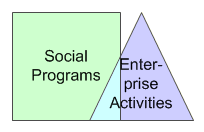 Social programs overlap with business activities, often sharing costs and assets. Organizations create integrated social enterprises as a funding mechanism to support the nonprofit's operations and mission activities.
Social programs overlap with business activities, often sharing costs and assets. Organizations create integrated social enterprises as a funding mechanism to support the nonprofit's operations and mission activities.
In many cases integrated social enterprises expand or enhance the organization’s mission enabling it to achieve greater social impact. Mission expansion may be achieved by commercializing the organization’s social services and selling them to a new fee-paying market; or by providing new services to existing clients. Integrated social enterprises leverage tangible and intangible assets, such as expertise, program methodology, relationships, brand, and infrastructure, as the basis from which to create their businesses.
The integrated social enterprise may be structured as a profit center or enterprise department within the nonprofit, or as separate entity.
The relationship between the business activities and the social programs are synergistic, adding value--financial and social--to one another.
Integrated social enterprises are often mission-related; their business activities are connected to the organization’s mission.
Integrated social enterprises are evident in operational models where:
- social and economic activities overlap;
- synergies exist between the social activities and the economic activities, such as cost-sharing, asset leveraging, enhancing systems and expanding or strengthening the mission;
- the target population (clients) is a direct beneficiary of income earned from the social enterprise vis-à-vis the financing it provides to the social programs; clients may or may not be involved in the enterprise's operations as employees or customers.
The following operational models often take the form of integrated social enterprise:
Scojo India, an example of Integrated Social Enterprise
Scojo Foundation is health social enterprise specialized in eye care. Scojo's work is premised on the statistic that globally 80% of all people above the age of 35 suffer from presbyopia--blurry up close vision. In developing countries where optometry is a privilege of the middle income and wealthy, presbyopia can have a devastating affect on the productive activities of the poor, who typically have little access to eye care. Seamstresses, rug makers, weavers, mechanics, bookkeepers, automobile or bicycle repair people, hairdressers, and others with occupations that require up close vision can loose their livelihoods and their incomes if they suffer from presbyopia. Simple low-cost readymade reading glasses, or simple magnifiers, enable these people to continue to work.
Scojo Foundation founders began their program activities using a traditional nonprofit approach: distributing free readymade reading glasses to the target population in greatest need, the rural poor, but quickly learned that this model was not sustainable. In 2003, they launched Scojo India, an integrated social enterprise that operates in two distinct markets in Andhra Pradesh state: urban centers, targeting working and middle class customers; and rural markets, targeting poor and low income people. Although greater social need exists in India’s rural areas, and subsequently an opportunity to effect deeper social impact than in urban areas, Scojo’s business could not operate exclusively in rural markets without ongoing subsidy.
Characteristics of Scojo's urban market such as high population density, existing retail distribution, coupled with local purchasing power and product price elasticity indicate suitable conditions for a profitable ready-made eyeglass business. Scojo's rural market, on the other hand, has notoriously high costs to sell and distribute eyeglasses in sparsely populated areas to customers (target population) who lack the ability to pay. Therefore, Scojo India created a social enterprise that integrates its business activities. The urban market is the commercial side of the social enterprise's operations while the rural market is the social program side of the social enterprise.
Manufacturing--Products for both markets are manufactured in the same local nonprofit facility, and though style is differentiated in urban markets according to preferences, there is no difference in quality. Scojo transfers modern spectacle frame- and lens-making technology to its Indian partner, building local capacity to enable production of higher quality readymade glasses than are currently available in India. The production facility creates employment opportunities for local people.
Distribution and sales--Integration occurs at the level of the marketing function, but not in the sales activities. Scojo India set a total sales target of 266,760 low-cost readymade reading glasses in the first three years of operation (2003-2006); urban markets represent 75.4% of sales or 201,060 units and rural markets 19.6% or 52,200 units (government sales make up the remaining 5.1%). In urban areas Scojo uses teams of sales agents to sell readymade glasses to non-optical retail stores such as pharmacies, general stores, and bookstores. Sales agents are also dispatched in innovative mobile sales units, vans stocked with glasses, to bring reading glasses to local factories. Scojo India sells reading glasses to hospitals, health and microcredit NGOs, who channel the glasses through their existing network of community-based vision health workers or microentrepreneurs, making it possible for Scojo to penetrate the rural market. Scojo also sells reading glasses to the State Government for re-sale to their employees.
Financial strategy and viability--Scojo India uses a cross-subsidization strategy to achieve social objectives while achieving financial viability. Profits generated from urban sales subsidize price and distribution costs in rural areas where the need for affordable reading glasses is greatest. Glasses are priced at $2.50 for customers in rural areas and $5-$6 for customers in urban areas. Total projected revenue earned in urban markets in the first three years is $460,800 as opposed to $59,805 in rural markets (government represents $10,028). Scojo India projects annual net revenue of $74,532 for business expansion and social program subsidies, and 27.3% ending return on equity in FY 2006.
Social Impact--By year end 2006, more than 266,760 Indians who obtained reading glasses will have improved their productivity and functionality. In three years Scojo India will have created 356 employment opportunities, 327 of which for very low income individuals. As well, micro-entrepreneurs distributing reading glasses in rural areas will earn an average supplemental income of $144 per year, substantial in rural India. The inclusion of moderate income urban customers permits Scojo to expand its target population and reach more people who can benefit from reading glasses, while providing additional funding to serve rural clients sustainably.
Market development and exit strategy--distribution of reading glasses in India is controlled by eye care professionals who lack the financial motivation to sell readymade reading glasses to people from low economic classes. Scojo's aim is to develop the market for readymade reading glasses and replicate the channel shift that took place in the West over a decade ago during which readymade reading glasses became available without prescription in mass-market retail outlets, creating a $1 billion industry. Market development inevitably brings competition. Rather than a threat, this is an opportunity for Scojo to achieve sustainability by transferring its interests to a local social enterprise and to exit the market, and then invest in new markets where the need for readymade reading glasses still exists.
As with other models, the integrated social enterprise model is not straightforward, the degree of integration between the program and business activity in the operational model depends on its purpose--the extent to which the enterprise is used as a funding mechanism or program mechanism. Unlike many integrated social enterprises, Scojo India is a mission-centric example: "to create a sustainable eyeglass manufacturing and distribution operation that makes affordable, quality readymade reading glasses readily available to all low to moderate income individuals in India." Thus, integration of Scojo India's social program and business activities is high. IONA Senior Services is and example of a mission-related social enterprise where less integration occurs between business and social activities.
[Source: Information provided by Yale School of Management and Goldman Sachs Foundation: Partnership on Nonprofit Ventures 2003; Scojo Business Plan Executive Summary]
